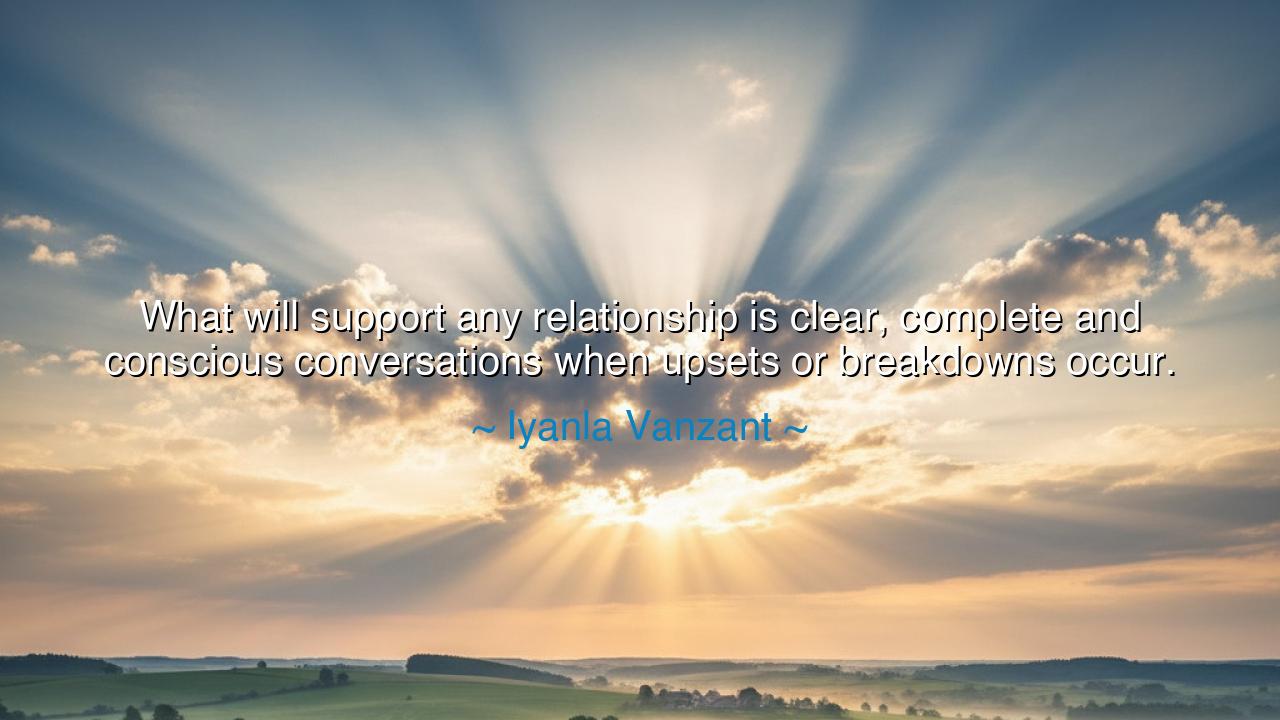
What will support any relationship is clear, complete and
What will support any relationship is clear, complete and conscious conversations when upsets or breakdowns occur.






When Iyanla Vanzant proclaims, “What will support any relationship is clear, complete, and conscious conversations when upsets or breakdowns occur,” she speaks as a healer of the human heart. Her words remind us that bonds are not maintained by silence or avoidance, but by the courage to meet one another in truth. The ancients would say: the tongue, guided by honesty and compassion, is the bridge across the chasm of discord.
The origin of this wisdom flows from the eternal struggles between souls bound together — families, friends, lovers, and companions. Since the dawn of time, upsets and breakdowns have arisen, for no bond is without strain. Vanzant, a teacher of spiritual restoration, unveils the path through such storms: not denial, not anger, but deliberate conversation rooted in awareness. Thus, she echoes the voices of sages who taught that words, rightly spoken, are medicine for the wounds of the spirit.
To be clear is to speak without deception or confusion, offering words that reveal rather than obscure. To be complete is to withhold nothing of importance, so that shadows do not fester into resentments. To be conscious is to speak with mindfulness, aware of one’s own heart and the heart of the other. These three qualities form the triad of healing speech, by which the broken threads of a relationship may be rewoven into strength.
Vanzant’s teaching reminds us that conflict is not the end, but the testing ground of love and loyalty. When conversations are avoided, distance grows; but when they are embraced with clarity and compassion, the bond is made deeper than before. In this way, the trial becomes the teacher, and the wound becomes the place of growth.
Let future generations remember: the strength of any relationship lies not in its freedom from conflict, but in the willingness to face conflict together with truth. Clear, complete, and conscious conversations are the tools by which love endures. Thus, Vanzant’s words endure as a lamp in the darkness, guiding all who seek lasting bonds through the storms of human frailty.






PT12A8_22_Nguyen Vu Phuong Thao
I love how this quote stresses the need for conscious conversations, but it raises a question for me: What if one person isn’t ready to have that conversation? Can you force someone to engage in clear, open communication, or is it something that both parties must be equally committed to? How do we approach these conversations without forcing a breakthrough, but still ensuring we work through the issue together?
KLNguyen Khanh Ly
Clear communication sounds like a solution to many relationship issues, but is it really that straightforward? What if one person is more emotionally reactive or less comfortable expressing themselves clearly? Could this approach unintentionally leave one party feeling unheard? I’m curious—how can we ensure that both sides of the conversation feel respected and understood, not just heard?
Ddarkuser25
This quote emphasizes the importance of open dialogue, which sounds simple in theory. But I often find that people avoid these conversations because they’re afraid of confrontation or upsetting the other person. Do you think it’s possible to cultivate a habit of clear and honest communication, especially when we’ve been hurt or frustrated? How can we create an environment where both people feel safe to speak openly?
TTNguyen tien tai
I completely agree with the idea that clear and conscious communication is the foundation of any strong relationship, especially during difficult times. But it makes me wonder—how do we maintain that level of clarity when emotions are running high? Is it possible to truly have a calm, conscious conversation when we're upset? What are some strategies to keep those conversations productive, rather than letting them escalate into arguments?